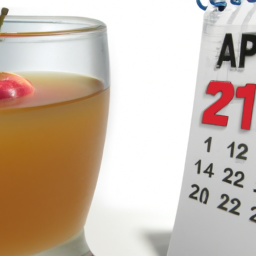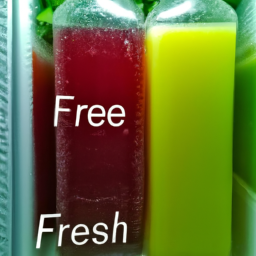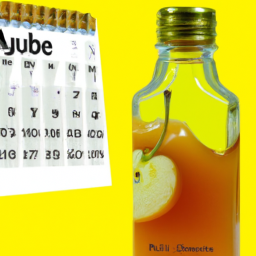Juice Tips and Tricks
How Long Apple Juice Last In The Fridge
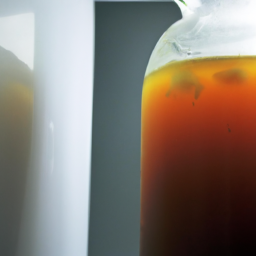
As a fan of sipping on a glass of apple juice in the morning or as a refreshing drink throughout the day, I often find myself wondering about how long this delicious beverage can last. How long can it be safely stored in the fridge? Can it be frozen for later use? And what signs should I look out for to know if it’s gone bad? These are important questions when it comes to storing and enjoying apple juice.
In this article, I will explore the science behind the shelf life of apple juice, including the factors that affect its freshness, how to properly store it in the fridge, and the signs to watch out for when it starts to spoil. Whether you prefer freshly squeezed or store-bought apple juice, understanding how to keep it fresh and safe for consumption is key to enjoying this beloved beverage to the fullest.
So, let’s dive in and learn more about how long apple juice lasts in the fridge.
Key Takeaways
- Freshly squeezed apple juice lasts 3-5 days in the fridge.
- Once opened, store-bought apple juice should be consumed within 7-10 days.
- The ideal temperature range for storing apple juice is between 32°F to 40°F.
- Storing apple juice in the fridge prolongs its shelf life and preserves its freshness.
The Shelf Life of Freshly Squeezed Apple Juice
If you’re wondering how long your freshly squeezed apple juice will last in the fridge, the answer is typically around 3-5 days. This is because fresh apple juice lacks the preservatives that are usually added to store-bought versions, which can extend their shelf life.
To ensure that your fresh apple juice stays fresh for as long as possible, it’s important to store it properly. To maximize apple juice preservation, it’s best to store fresh apple juice in an airtight container, such as a glass jar or plastic bottle, in the refrigerator. Make sure the container is sealed tightly to prevent air from getting in, which can cause the juice to spoil faster.
Additionally, be sure to keep the juice away from other foods in the fridge that could contaminate it. By following these guidelines, you can enjoy your fresh apple juice for up to 5 days.
When it comes to store-bought apple juice, however, the shelf life may vary depending on the type of juice and the preservatives used.
The Shelf Life of Store-Bought Apple Juice
When you buy apple juice from the store, it’ll stay fresh for a certain amount of time. The shelf life of store-bought apple juice depends on several factors, including the type of packaging, the storage conditions, and the processing method used.
Typically, unopened apple juice can last for up to one year when stored in a cool and dry place. However, once you open the bottle, the juice’s shelf life decreases significantly. One way to tell if apple juice has gone bad is to check for any changes in color, smell, or taste. Additionally, any signs of mold or unusual cloudiness can indicate spoilage. To extend the shelf life of apple juice after opening, it’s best to refrigerate it and consume it within 7-10 days. Proper storage methods play a key role in preserving the flavor and safety of the juice.
If the juice appears cloudy or has a sour smell, it’s likely that it has gone bad and should be disposed of immediately. Additionally, if the juice has an off taste or is fizzy, it’s a sign that the juice has started to ferment and should not be consumed. To properly dispose of expired apple juice, pour it down the sink and rinse the container thoroughly with hot water.
The type of container affects shelf life, as we’ll explore in the next section.
The Type of Container Affects Shelf Life
Did you know that choosing the right container for apple juice storage is important to keep it fresh for longer? The type of container you use can affect the flavor and quality of the apple juice. Glass or plastic containers with tight-fitting lids are the best options as they prevent air from entering the container, which can cause the apple juice to spoil quickly.
Moreover, the impact of temperature on apple juice freshness cannot be ignored. The ideal temperature range for storing apple juice is between 32°F to 40°F. If the temperature rises above this range, the apple juice may start to ferment and develop a sour taste.
Therefore, it is essential to store apple juice in a cool place, away from direct sunlight and heat sources, to ensure its freshness and quality.
Now, let’s talk about how long apple juice lasts in the fridge.
Storing Apple Juice in the Fridge
To keep your refreshing glass of apple juice tasting its best, make sure to store it in the fridge using a sealed container and avoid exposing it to heat or sunlight. Storing apple juice in the fridge prolongs its shelf life and preserves its freshness. It is important to note that once opened, apple juice should be consumed within 7 to 10 days, even if it is stored in the fridge.
To ensure that you are storing your apple juice correctly, it is best to use a container that is specifically designed to preserve the freshness of the juice. Glass containers or plastic bottles with airtight lids are great options for storing apple juice in the fridge. Below is a table outlining some of the best apple juice brands and their recommended storage methods:
| Brand | Storage Method | Shelf Life |
|---|---|---|
| Simply Apple | Refrigerate after opening | 7-10 days |
| Martinelli’s | Refrigerate after opening | 7-10 days |
| Tree Top | Refrigerate after opening | 7-10 days |
If you have more apple juice than you can drink within the recommended time frame, freezing the juice is a great option to extend its shelf life.
Freezing Apple Juice
I’ve always wondered if it’s possible to freeze apple juice and how long it lasts in the freezer.
After doing some research, I found out that you can freeze apple juice, and it’s a great way to prolong its shelf life.
To freeze apple juice, simply pour it into a freezer-safe container, leaving some space at the top for expansion, and then seal it tightly.
Frozen apple juice can last up to 8 months in the freezer if stored properly.
Can You Freeze Apple Juice?
Freezing apple juice is a popular method for extending its shelf life, but does it truly maintain its taste and quality? As someone who’s tried freezing apple juice before, I can attest that the taste isn’t quite the same as fresh juice.
However, freezing apple juice can still be useful for creating creative recipes using frozen apple juice, such as frozen apple juice popsicles or using it as an ingredient in smoothies or cocktails.
When it comes to the taste of frozen apple juice, it’s important to note that freezing affects the texture and flavor of the juice. The freezing process can cause the juice to separate, resulting in a less smooth and slightly grainy texture. Additionally, the flavor of the juice may be slightly altered, with some of the natural sweetness being lost in the freezing process.
Despite these changes, frozen apple juice can still be a convenient and cost-effective way to enjoy apple juice throughout the year.
If you’re interested in learning how to freeze apple juice, it’s important to properly store the juice in an airtight container or freezer bag to prevent freezer burn. Additionally, make sure to leave some room at the top of the container for the juice to expand as it freezes.
By following these simple steps, you can enjoy the benefits of frozen apple juice in your favorite recipes all year round.
How to Freeze Apple Juice
By placing the refreshing and sweet apple nectar in a tightly sealed container and leaving some space at the top, you can freeze it and have a refreshing glass of icy apple juice anytime. Freezing apple juice is an excellent way to preserve it for future use. It is also a great way to reduce waste and save on expenses. Once frozen, you can use apple juice for creative uses and DIY projects like making apple juice popsicles, apple juice ice cubes, and apple juice granita.
To freeze apple juice, start by choosing a freezer-safe container that is the right size for the amount of juice you have. Make sure to leave some space at the top of the container to allow for expansion during freezing. Then, pour the apple juice into the container and seal it tightly. Label the container with the date and place it in the freezer. The table below provides a guide on how long you can freeze apple juice for optimal quality and flavor.
| Freezer Temperature | Frozen Apple Juice Shelf Life |
|---|---|
| 0°F or lower | 8-12 months |
| 10°F | 6-9 months |
| 20°F | 4-6 months |
| 30°F | 1-2 months |
As you can see, the colder the freezer temperature, the longer the frozen apple juice will last. However, it is important to note that while frozen apple juice may last for several months, its quality and flavor may deteriorate over time. In the next section, we will discuss how long frozen apple juice lasts and how to tell if it has gone bad.
How Long Frozen Apple Juice Lasts
To keep your icy apple nectar fresh and sweet as a summer breeze, imagine a snowman in your freezer and remember to label and store it properly for up to a year.
Frozen apple juice is a great addition to your pantry, especially if you love baking. You can use it in recipes like apple pies, apple tarts, and apple muffins.
Aside from using it as a baking ingredient, you can also thaw it to make a refreshing apple juice or apple cider drink.
When it comes to thawing frozen apple juice, the best way is to transfer it to the refrigerator and leave it overnight. This allows the juice to thaw slowly, maintaining its flavor and texture. If you’re in a hurry, you can thaw it quickly by placing the frozen juice in a bowl of warm water.
Do not use a microwave to thaw frozen apple juice as this can affect its taste and quality.
As we’ve learned how to thaw frozen apple juice, the next step is to know how to spot signs of spoiled apple juice.
Signs of Spoiled Apple Juice
You’ll know when your apple juice has gone bad if it has a funky smell or taste. Spoiled apple juice may also have a cloudy appearance or fizziness, indicating fermentation. Another sign is the presence of mold or yeast growth. If you notice any of these signs, it’s best to discard the juice.
To prevent apple juice spoilage, it’s important to store it properly. Keep it refrigerated at all times and consume it within 7-10 days after opening. Airtight containers can also help to prevent contamination and prolong freshness. Additionally, be sure to check the expiration date before purchasing apple juice.
With these precautions, you can enjoy fresh and flavorful apple juice for longer. Moving on to tips for keeping apple juice fresh, one effective method is to freeze it in ice cube trays for later use.
Tips for Keeping Apple Juice Fresh
As the autumn season approaches, your taste buds crave the sweet and crisp flavor of freshly squeezed apple nectar, and with a few simple tricks, your glass can be filled to the brim with the same refreshing taste every time. To keep your apple juice fresh and tasty, you need to store it properly. Here are some tips for keeping apple juice fresh:
| Tip | Explanation |
|---|---|
| Keep it refrigerated | Apple juice should always be kept in the fridge, as it helps to slow down the oxidation process. This process causes the juice to lose its flavor and color over time. |
| Use airtight containers | Exposure to air can cause the juice to spoil faster. It is essential to store your apple juice in an airtight container to prevent air from getting inside. |
| Consume within 7 days | Apple juice can last up to 7 days in the fridge. After that, it starts to lose its freshness and flavor. It is best to consume it within the first week of opening the bottle. |
In addition to these tips, there are many creative recipes you can try with apple juice. You can use it as a base for smoothies or cocktails, or even use it as a marinade for meat. If you want to switch things up, try juicing alternatives like pears, carrots, or oranges to create unique and delicious blends.
When your apple juice has expired, there are still ways to use it. Stay tuned for the next section, where we will explore some creative ways to use expired apple juice.
Using Expired Apple Juice
Hey there, got expired apple juice sitting in your fridge? Don’t toss it out just yet, there are plenty of ways to give it a new life!
One way to repurpose expired apple juice is to use it as a cooking ingredient. Apple juice can be used in marinades, sauces, and dressings to add a sweet and tangy flavor to your dishes. You can also use it as a substitute for other liquids in baking, such as milk or water, to add a hint of apple flavor to your baked goods.
Another way to use expired apple juice is as a base for homemade vinegar. Mix the apple juice with a bit of vinegar mother (the live bacteria used to ferment vinegar) and let it sit in a warm, dark place for a few weeks. You’ll have homemade apple cider vinegar that can be used in cooking, cleaning, and even as a natural remedy for various ailments.
Now, if you’re wondering about the benefits of drinking apple juice, let’s dive into that next.
Benefits of Drinking Apple Juice
I’m excited to discuss the benefits of drinking apple juice!
Not only is it a delicious and refreshing beverage, but it’s also packed with essential nutrients like vitamin C and potassium.
Additionally, studies have shown that drinking apple juice may improve heart health, digestion, and cognitive function.
Nutritional Value of Apple Juice
You can easily incorporate apple juice into your diet because it’s rich in essential vitamins and nutrients. Apple juice is made from the processing of apples and comes in different types such as clear, cloudy, and organic. Here are some of the nutritional benefits of drinking apple juice:
-
High in Vitamin C: Apple juice contains a high amount of Vitamin C, which strengthens the immune system and helps prevent chronic diseases.
-
Rich in Antioxidants: Apple juice contains antioxidants such as flavonoids and polyphenols that help reduce inflammation and protect against cell damage.
-
Good Source of Fiber: Apple juice contains soluble fiber that helps regulate digestion and reduces the risk of heart disease.
-
Natural Energy Boost: Apple juice contains natural sugar that provides an energy boost without the crash that comes from artificial sweeteners.
-
Lowers Cholesterol: Apple juice contains pectin, a soluble fiber that helps lower LDL cholesterol levels.
These benefits make apple juice a healthy addition to your diet. Drinking apple juice regularly can help improve your overall health and well-being. Moving on to the next subtopic, let’s explore the many health benefits of drinking apple juice.
Health Benefits of Drinking Apple Juice
If you’re looking for a delicious way to improve your health, incorporating apple juice into your daily routine can provide a multitude of benefits. Apple juice is not only refreshing, but it also contains important nutrients such as vitamins A and C, potassium, and antioxidants. These nutrients play a crucial role in keeping your body healthy and functioning properly.
One of the key benefits of drinking apple juice is that it can boost your immune system. Apples contain a type of fiber called pectin, which has been shown to have prebiotic effects, meaning it helps feed the good bacteria in your gut. This can strengthen your immune system and reduce your risk of getting sick. Additionally, apple juice is rich in antioxidants, which can help to reduce inflammation, regulate digestion, and lower cholesterol levels. With so many health benefits, it’s no wonder that apple juice is a popular beverage choice for many. If you’re looking to incorporate apple juice into your diet, there are plenty of delicious apple juice recipes to try and different types of apples to choose from for juicing.
Frequently Asked Questions
Can I mix fresh and store-bought apple juice?
I would not mix fresh and store-bought apple juice as they have different flavors and consistencies. Fresh juice has a more intense taste and can be thicker, while store-bought juice may have preservatives and a milder taste.
Does adding sugar or other sweeteners affect the shelf life of apple juice?
Sweeteners can affect the preservation of apple juice. The addition of sugar can increase the risk of spoilage, as it provides a food source for bacteria. Proper storage and pasteurization are crucial for extending shelf life.
Can I store apple juice in a glass jar instead of a plastic bottle?
Did you know that glass is a better option than plastic for storing apple juice? Not only is it more environmentally friendly, but it also doesn’t contain harmful chemicals. So, yes, you can store apple juice in a glass jar without any concern about its shelf life.
Is it safe to drink apple juice after it has been left out of the fridge for a few hours?
It is not recommended to drink apple juice that has been left out of the fridge for a few hours. The drinking temperature and shelf stability of the juice are compromised, increasing the risk of bacterial growth and spoilage.
Can I use apple juice that has been frozen and thawed in a recipe that calls for fresh apple juice?
I have successfully used frozen apple juice in recipes calling for fresh juice by properly thawing it in the fridge and storing any unused portions in a sealed container in the fridge for up to a week. Follow thawing and storage guidelines for best results.
Conclusion
In conclusion, knowing how long apple juice lasts in the fridge can help you enjoy its delicious taste for longer. Whether it’s freshly squeezed or store-bought, the shelf life of apple juice depends on various factors such as the type of container used, storage conditions, and expiration date.
By storing apple juice in the fridge and freezing it if necessary, you can extend its shelf life and prevent spoilage. However, if you notice any signs of spoiled apple juice, such as a sour odor or cloudy appearance, it’s best to discard it.
On the other hand, if you have expired apple juice, you can still use it for cooking or baking. Drinking apple juice has numerous benefits for your health, such as improving digestion, boosting immunity, and reducing the risk of chronic diseases.
So, next time you sip on a glass of apple juice, savor its crisp and refreshing taste while reaping its health benefits.
Cindy thoroughly researches juicing trends, techniques, and recipes to provide readers with practical advice and inspiration. Her writing style is accessible, engaging, and designed to make complex concepts easy to understand. Cindy’s dedication to promoting the advantages of juicing shines through her work, empowering readers to make positive changes in their lives through the simple act of juicing.
Juice Tips and Tricks
How Does Aloe Vera Juice Taste

I recently began incorporating aloe vera juice into my daily regimen, and initially, I was a little reluctant. The idea of consuming a liquid derived from the same spiky plant that grows on my windowsill felt odd. However, after conducting some research, I learned that aloe vera juice offers a range of health benefits, including improving digestion and enhancing the immune system. Consequently, I made the choice to give it a chance.
Now, the question on everyone’s mind when it comes to aloe vera juice is, how does it taste? Well, let me tell you, it’s not your typical juice flavor. It has a unique taste that can be a bit difficult to describe. But don’t worry, I’m here to break it down for you.
In this article, we’ll explore the factors that affect the taste of aloe vera juice, common taste descriptions, and even some tips for improving the taste. So, let’s dive in and discover the taste of aloe vera juice together.
Key Takeaways
- Aloe vera juice can have a slightly bitter taste with a hint of sweetness, or it can be refreshing and slightly sweet, bitter and unpleasant, or mild and earthy, depending on the mixing preferences and ingredient combinations used.
- Some brands may use additives or preservatives that can alter the flavor of aloe vera juice.
- Aloe vera juice is rich in nutritional content, containing vitamins, minerals, and amino acids that provide numerous health benefits, such as aiding in digestion, boosting the immune system, and helping with skin health.
- Experimenting with different flavor combinations can help you enjoy the health benefits of aloe vera juice without sacrificing taste, and it can be consumed in other ways besides drinking it straight, making it a versatile addition to any beverage lineup.
Overview of Aloe Vera Juice
You’ll be pleasantly surprised by how refreshing aloe vera juice tastes. It has a subtle sweetness with a slightly tangy and refreshing aftertaste.
Aloe vera juice is made from the gel-like substance found inside the leaves of the aloe vera plant. The juice is packed with vitamins, minerals, and antioxidants that provide numerous health benefits, making it a popular health drink.
Aloe vera juice is easy to prepare, and it can be made at home by blending the gel with water. It’s essential to store the juice in the refrigerator to maintain its freshness and prevent spoilage.
Aloe vera juice has a mild taste that makes it easy to mix with other juices and smoothies. As we move on to the next section, we’ll explore the factors that can affect the taste of aloe vera juice.
Factors that Affect Taste
Savor the subtle sensations of sweet and sour, as the flavor of aloe vera juice is shaped by several factors. One of the biggest influences on taste is personal flavor preferences. Some people enjoy the slightly bitter taste of aloe vera juice, while others find it too overpowering.
Additionally, ingredient combinations can greatly affect the taste. For example, adding citrus or sweet fruits can help mask the bitterness and make the juice more palatable.
Another factor that contributes to the taste of aloe vera juice is the processing method used. Some brands may use additives or preservatives, which can alter the flavor. It’s important to read labels and choose a brand that uses natural ingredients and minimal processing.
Overall, the taste of aloe vera juice can be described as slightly bitter with a hint of sweetness. In the next section, we’ll explore common taste descriptions in more detail.
Common Taste Descriptions
When it comes to describing taste, I find that there are three common categories that most flavors fall into: refreshing and slightly sweet, bitter and unpleasant, and mild and earthy.
The first category can be found in drinks like lemonade or watermelon juice, where the sweetness isn’t overpowering but adds a pleasant note to the overall taste.
Bitter and unpleasant flavors are often found in strong coffee or certain types of vegetables, and can be an acquired taste for some.
Lastly, mild and earthy flavors can be found in foods like mushrooms or grains, and offer a subtle but satisfying taste.
Refreshing and Slightly Sweet
Feeling parched on a hot summer day? Take a sip of aloe vera juice and taste the refreshing, slightly sweet flavor that will quench your thirst. The taste is a perfect match for those who love refreshing drinks and natural sweeteners.
The refreshing nature of aloe vera juice comes from its cooling properties, which soothe the body and provide relief from the heat. Meanwhile, the natural sweetness of the juice comes from the natural sugars present in the plant. This combination creates a flavor that is light and subtle, making it a great option for those who are looking for a healthy and refreshing drink.
However, not all aloe vera juices are created equal, and some may have a bitter and unpleasant taste.
Bitter and Unpleasant
You may find that some aloe vera juices leave a bitter taste in your mouth, like a mouthful of unripe grapefruit. This is because the inner gel of the aloe plant contains aloin, a yellow-colored compound that can be quite bitter when ingested.
Taste preference plays a significant role here, as some people may enjoy the bitterness, while others may find it unpleasant. However, it’s worth noting that not all aloe vera juices taste like this, as some brands add flavor additives to mask the bitterness and enhance the overall taste.
If you have a specific preference for a certain flavor, you may want to check the ingredients of the aloe vera juice before purchasing it. Some brands may use natural flavorings like honey or lemon to provide a sweet taste, while others may use artificial sweeteners or preservatives that can affect the overall flavor. Alternatively, you can opt for a pure aloe vera juice that doesn’t contain any additional flavor additives, but be prepared for a slightly bitter taste.
Moving on to the next section, some aloe vera juices have a mild and earthy taste that is quite different from the bitter one we just discussed.
Mild and Earthy
Imagine taking a sip of aloe vera juice and being transported to a serene forest. The mild and earthy taste reminds you of the freshness of nature. The flavor profile of aloe vera juice is subtle, with a slightly sweet and herbaceous taste. Unlike other bitter and unpleasant health drinks, aloe vera juice is refreshing and easy to drink.
As for pairing suggestions, aloe vera juice goes well with citrus fruits like lemon and lime, as well as other juices such as pineapple and apple. It can also be mixed with herbal teas or added to smoothies for an extra boost of nutrients. With its mild and earthy taste, aloe vera juice is a versatile addition to any beverage lineup.
Drinking aloe vera juice not only tastes good, but it also provides numerous health benefits.
Health Benefits
Experiencing the health benefits of aloe vera juice is worth it, as it can aid in digestion, boost your immune system, and even help with skin health. Aloe vera juice is rich in nutritional content, containing vitamins like C, E, and B12, minerals like calcium and magnesium, and amino acids. Scientific research suggests that aloe vera juice can also help reduce inflammation and regulate blood sugar levels.
It’s important to follow dosage recommendations when consuming aloe vera juice, as it can have potential interactions with certain medications. It’s best to start with a small amount and gradually increase the dosage, monitoring how your body reacts. If you experience any adverse effects, stop consuming the juice and consult with your healthcare provider.
Incorporating aloe vera juice into your daily routine can have numerous health benefits, but it’s important to do it safely and responsibly. When looking to improve the taste of aloe vera juice, there are a few tips that can help. Mixing it with other juices, like orange or pineapple, can help balance out the earthy taste. Adding a small amount of honey or agave syrup can also sweeten the juice without adding too much sugar. Experimenting with different flavor combinations can help you find a way to enjoy the health benefits of aloe vera juice without sacrificing taste.
Tips for Improving Taste
Sprucing up the flavor of aloe vera juice can be tough, but with a little creativity and outside-the-box thinking, you can turn it into a delicious and refreshing beverage that hits the spot. Here are some tips for improving the taste of aloe vera juice:
-
Flavor balancing: Aloe vera juice has a strong, bitter taste that can be overwhelming. To balance out the flavor, try adding a splash of citrus juice, such as lemon or lime. This will help tone down the bitterness and add a tangy, refreshing taste.
-
Natural sweeteners: If you prefer a sweeter taste, try adding a natural sweetener such as honey or agave syrup. These sweeteners will add a touch of sweetness without overpowering the natural flavor of the aloe vera.
-
Mix with other juices: Mixing aloe vera juice with other fruit juices can help improve the taste and make it more palatable. Try mixing aloe vera juice with apple, pineapple, or mango juice for a delicious and refreshing beverage.
-
Chill before serving: Aloe vera juice tastes best when served cold. Chill the juice in the refrigerator before serving, or add ice cubes to the glass for a refreshing and cooling drink.
With these tips, you can make aloe vera juice taste great and enjoy the many health benefits it has to offer. Alternatively, there are other ways to consume aloe vera that don’t involve drinking it straight.
Alternative Ways to Consume Aloe Vera
One tasty way to reap the health benefits of aloe vera is by adding it to smoothies or other blended drinks. I love making a refreshing smoothie with aloe vera juice, spinach, pineapple, and avocado. The aloe vera adds a subtle sweetness and a refreshing taste that complements the other ingredients perfectly.
Another way to use aloe vera in skincare is by mixing it with other natural ingredients like honey, turmeric, or cucumber to make a soothing face mask. This can help to hydrate, soothe, and rejuvenate the skin, leaving it looking and feeling healthy and radiant.
In addition to these delicious and nourishing ways to use aloe vera, there are also a variety of supplements available that can help promote overall health. Aloe vera supplements are available in many forms, including capsules, gummies, and powders. These supplements can help support digestion, boost the immune system, and improve skin health. However, it’s important to be aware of any potential risks and side effects associated with aloe vera supplements, which we will explore in the next section.
Risks and Side Effects
Be aware of the potential risks and side effects associated with taking aloe vera supplements, as they can affect your digestion, skin health, and immune system. Here are some potential discussion ideas for risks and side effects:
-
Allergic reactions: Some people may be allergic to aloe vera and experience symptoms such as hives, itching, and swelling. It’s important to perform a patch test before consuming aloe vera supplements or applying aloe vera topically.
-
Interactions with medication: Aloe vera may interact with certain medications, including diabetes medications, diuretics, and heart medications. It’s important to talk to your healthcare provider before taking aloe vera supplements if you’re on any medication.
-
Diarrhea: Aloe vera supplements may cause diarrhea in some people, especially if taken in large amounts. It’s important to follow the recommended dosage on the label and start with a small amount to see how your body reacts.
-
Skin irritation: Applying aloe vera topically may cause skin irritation in some people, especially those with sensitive skin. It’s important to perform a patch test before using aloe vera topically and diluting it with water or a carrier oil if needed.
When it comes to choosing the right aloe vera juice, it’s important to consider the quality and purity of the product.
How to Choose the Right Aloe Vera Juice
After discussing the potential risks and side effects of consuming aloe vera juice, let’s move on to the next important aspect of choosing the right aloe vera juice – taste preference. As someone who’s tried various brands of aloe vera juice, I can attest that the taste can vary greatly.
Some brands have a bitter taste, while others have a milder, sweeter taste. It’s important to choose a brand that aligns with your personal taste preferences to make the experience more enjoyable.
When choosing brands, it’s important to read the labels and ensure that the aloe vera juice is made from pure, organic aloe vera gel. Some brands may contain added sugars or artificial flavors which can affect the taste and overall health benefits of the juice.
Additionally, it’s important to consider the processing method of the aloe vera juice. Cold-pressed juices are gentler on the plant’s nutrients and may have a more potent taste, while heat-processed juices may have a milder taste but may not retain as many nutrients.
Now that we’ve covered how to choose the right aloe vera juice, let’s explore where to buy it.
Where to Buy Aloe Vera Juice
I love a good aloe vera juice, and finding the right place to buy it is important to me. Personally, I prefer shopping at health food stores because they generally have a wider selection of brands and products.
However, if I can’t find what I’m looking for there, I also like to check out online retailers and specialty shops that specialize in natural and organic products.
Health Food Stores
You’ll find a variety of aloe vera juice options at health food stores, each with its own unique taste and potential health benefits. I personally love going to my local health food store to browse their selection of aloe vera juice. It’s always exciting to try out new brands and flavors, and I find that health food stores often carry some of the more unique and niche options.
One of the benefits of buying aloe vera juice at a health food store is that you can typically find high-quality, organic options. However, some of these options may come with a higher price tag. Popular brands that I’ve seen at health food stores include Lily of the Desert, ALO, and Fruit of the Earth. While aloe vera juice can have a slightly bitter taste, some brands add sweeteners or other flavors to make it more palatable. Overall, I highly recommend checking out your local health food store for a wide selection of aloe vera juice options.
Moving on to the next section about online retailers, you can also find a great selection of aloe vera juice options online.
Online Retailers
Shopping online for aloe vera juice is like opening a treasure chest of healthy possibilities, with a plethora of brands and flavors to explore. Here are some reasons why I love browsing through online retailers for my aloe vera juice needs:
-
Customer Reviews: Online retailers have a section for customer reviews that I find very helpful in making my purchase decisions. I can read what others have to say about a specific brand or flavor and get a better idea of what to expect.
-
Shipping Policies: Most online retailers offer free shipping or have a minimum order requirement to qualify for free shipping. This is a great way to save money and stock up on my favorite aloe vera juice without leaving the comfort of my home.
-
Variety of Brands: Online retailers carry a wide range of brands, from well-known ones to more niche options. This allows me to try new brands and flavors that I may not be able to find in my local health food store.
-
Convenience: Shopping online for aloe vera juice is convenient and saves me time. I can easily compare prices, read reviews, and make my purchase without leaving my home.
-
Discounts and Deals: Online retailers often have special promotions, discounts, and deals that I can take advantage of. This helps me save money and try new products without breaking the bank.
As much as I enjoy browsing through online retailers, I also love visiting specialty shops for my aloe vera juice needs.
Specialty Shops
Walking into a specialty shop for aloe vera juice is like stepping into a world of organic, natural goodness. The ambiance is calming, and the smell of fresh aloe vera leaves fills the air.
The walls are lined with bottles of aloe vera juice, each with their unique blends and specialty flavors. As I look around the shop, I notice the various juices with flavors like pineapple, mango, and strawberry. The colors of the juices are inviting and look refreshing.
I’m intrigued by the unique blends that the shop offers, like aloe vera mixed with ginger and honey. I try a sample of the ginger-honey blend, and it’s surprisingly refreshing. The taste is sweet with a hint of spice, and the aloe vera isn’t overpowering.
Specialty shops offer a wider variety of aloe vera juice flavors, making the experience more enjoyable.
Frequently Asked Questions
Can aloe vera juice be used topically on the skin?
Using aloe vera juice topically on the skin can have numerous benefits. It’s known for its ability to soothe and hydrate the skin, reduce inflammation, and even help with acne. I highly recommend incorporating it into your skincare routine.
What is the recommended daily dosage of aloe vera juice?
I recommend consuming 2-4 ounces of aloe vera juice daily, but be cautious as it may cause diarrhea or stomach discomfort. While it’s a natural remedy, it’s still important to consult with a healthcare professional before use.
Is aloe vera juice safe for pregnant women to consume?
As a pregnant woman, I researched the benefits and risks of consuming aloe vera juice. It may cause uterine contractions and diarrhea, and there is limited research on its safety. Consult with a healthcare provider before consuming.
Can aloe vera juice be mixed with other drinks or ingredients?
Mixing options for aloe vera juice are endless. Personally, I prefer to mix it with citrus fruits for a tangy kick. Depending on taste preferences, it can also be blended with honey, ginger, or even coconut water.
How long does a bottle of aloe vera juice typically last once opened?
Once opened, a bottle of aloe vera juice typically lasts for about a week in the refrigerator. It’s important to store it properly by keeping it tightly sealed and away from direct sunlight. Check the expiration date before consuming. Similarly, it’s crucial to be mindful of how long celery juice lasts after opening. Generally, celery juice should be consumed within 2 to 3 days if refrigerated to maintain its freshness and nutritional benefits. Always ensure both aloe vera and celery juice are stored in airtight containers to avoid spoilage.
Conclusion
Well, there you have it folks – the taste of aloe vera juice can be quite polarizing. But with its numerous health benefits, it’s definitely worth a shot.
For me, the taste is reminiscent of a slightly bitter cucumber with a hint of sweetness. It’s not the most delicious drink out there, but it’s definitely tolerable.
If you’re having trouble with the taste, try mixing it with other flavors like citrus or honey to make it more enjoyable. Alternatively, you can try consuming it in a different form like a capsule or gel.
But remember, always choose a high-quality aloe vera juice to ensure that you’re getting all the benefits and none of the risks. So go ahead, give it a try and see how your taste buds react. Who knows, you might just discover your new favorite health drink!
Cindy thoroughly researches juicing trends, techniques, and recipes to provide readers with practical advice and inspiration. Her writing style is accessible, engaging, and designed to make complex concepts easy to understand. Cindy’s dedication to promoting the advantages of juicing shines through her work, empowering readers to make positive changes in their lives through the simple act of juicing.
Juice Tips and Tricks
How Does Lemon Juice Cook Shrimp
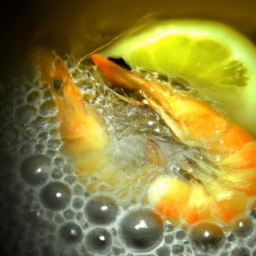
As an experienced chef, I have tried out different methods for cooking shrimp. One particular technique that has caught my interest is using lemon juice to marinate the shrimp.
At first, it may seem counterintuitive to use an acidic ingredient to cook seafood, but the process, known as cooking by acid, is a common cooking method that is used in many cuisines around the world. Cooking by acid is a process where the acid in a marinade or sauce breaks down the proteins in the food, resulting in a tender and flavorful dish.
When it comes to shrimp, lemon juice is a popular ingredient in marinades, dressings, and sauces. But can it actually cook the shrimp? In this article, I will explore the science behind this cooking method, the steps to preparing and marinating shrimp with lemon juice, and alternative cooking methods to consider.
Key Takeaways
- Lemon juice is a popular ingredient in marinades, dressings, and sauces for shrimp, and can be used to cook shrimp through a process called cooking by acid.
- Cooking with acid is a healthier option as it does not require added fats or oils, and lemon juice is less harsh than other acids, such as vinegar or lime juice, which can overpower the delicate flavor of the shrimp.
- Marinating the shrimp in lemon juice for 10-15 minutes before cooking can help to infuse the flavor into the shrimp and ensure that it is evenly coated, and adding herbs and spices can help to add depth and complexity to the dish.
- Fresh lemon juice is important to use as bottled juice can contain preservatives that can affect the taste and texture of the shrimp, and cooking with acid is a low-calorie cooking method that does not require added fats or oils.
What is Cooking by Acid?
So, how exactly does lemon juice work its magic in cooking shrimp? Well, it all comes down to a process called cooking by acid. This method, often referred to as “ceviche-style,” relies on the citric acid in the lemon juice to break down the proteins in the shrimp, effectively “cooking” it without heat. Similar to **how shrimp cooks in lime juice**, the acid causes the flesh to become firm and opaque, transforming the texture and flavor. This chemical reaction is what gives ceviche and other acid-cured seafood dishes their distinctive taste and appearance.
Acidic cooking benefits seafood and meat by tenderizing and breaking down proteins, making them easier to digest and chew. It also imparts a tangy, citrusy flavor that complements the natural sweetness of shrimp.
While lemon juice is the most commonly used acid for cooking seafood, other acids such as lime juice, vinegar, and wine can also be used. Each acid has its own unique flavor profile and can enhance the taste of certain dishes.
However, it’s important to use the right amount of acid to avoid overcooking or overpowering the dish. With the right balance, cooking by acid can transform a simple shrimp dish into a flavorful and tender meal. And that’s exactly what lemon juice does for shrimp!
Lemon Juice and Shrimp
I’ve always loved the tangy taste of shrimp cooked in lemon juice. But did you know that lemon juice is actually the ideal acid for cooking shrimp? Its high acidity helps to tenderize the shrimp and infuse it with flavor.
When choosing the right type of lemon juice, it’s important to look for one that is fresh and free of any additives or preservatives.
Why Lemon Juice is the Ideal Acid for Cooking Shrimp
Lemon juice is the most popular acid used for cooking shrimp, with over 80% of recipes calling for it. There are several advantages of using lemon juice over other acids when cooking shrimp. Firstly, lemon juice is less harsh than other acids, such as vinegar or lime juice, which can overpower the delicate flavor of the shrimp.
Secondly, lemon juice contains natural sugars that complement the sweetness of the shrimp, creating a perfect balance of flavors. Finally, lemon juice has a low pH level, which helps to denature the protein in the shrimp, resulting in a firmer and more tender texture.
To enhance the flavor of lemon juice cooked shrimp, there are a few tips to keep in mind. Firstly, it’s important to use fresh lemon juice, as bottled juice can contain preservatives that can affect the taste and texture of the shrimp. Secondly, adding herbs and spices, such as garlic, parsley, and red pepper flakes, can help to add depth and complexity to the dish. Finally, marinating the shrimp in lemon juice for 10-15 minutes before cooking can help to infuse the flavor into the shrimp and ensure that it is evenly coated.
When choosing the right type of lemon juice for cooking shrimp, it’s important to consider the acidity level and whether it’s sweet or sour. The next section will explore the different types of lemon juice and how to choose the best one for cooking shrimp.
How to Choose the Right Type of Lemon Juice
When selecting the ideal type of citrus for cooking shrimp, it’s essential to consider the acidity and sweetness of the lemon juice to achieve the perfect balance of flavors.
Some cooks prefer bottled lemon juice for its convenience and consistency, while others opt for fresh lemon juice for its bright, zesty flavor. When using bottled lemon juice, be sure to check the label for any added sugars or preservatives that may affect the taste of the dish.
Another factor to consider when choosing lemon juice is whether to use organic or conventional. Organic lemons are grown without the use of pesticides or synthetic fertilizers, making them a healthier and more environmentally friendly option. However, they may be more expensive and harder to find than conventional lemons.
Ultimately, the choice between bottled or fresh, and organic or conventional lemon juice, depends on personal preference and availability. With the right type of lemon juice, you can elevate the flavor of your shrimp dish to new heights.
Now that you’ve chosen the perfect lemon juice for your shrimp, it’s time to prepare the shrimp for cooking.
Preparing the Shrimp
Before we dive into cooking our shrimp, it’s important to properly prepare them. As someone who loves seafood, I’ve learned a few tips for choosing the best quality shrimp and how to clean and devein them.
First, always look for shrimp that have a firm texture and a slightly sweet smell.
Secondly, to clean and devein the shrimp, start by removing the head and shell. Then, make a shallow cut down the back to expose the vein and remove it with a knife or toothpick.
How to Clean and Devein Your Shrimp
First things first, you’ll want to grab your shrimp and give them a good rinse under cold water. This ensures that any dirt or debris is removed from the surface of the shrimp.
Next, it’s time to properly clean and devein your shrimp. To do this, use a sharp knife to cut along the back of the shrimp and remove the digestive tract. It’s important to remove this because it can give the shrimp a gritty texture and a bitter taste.
Proper cleaning is just the first step in preparing your shrimp for cooking. You’ll also want to season them properly to enhance their natural flavors. A simple mixture of lemon juice, garlic, and olive oil can do wonders for shrimp.
When cooking, the optimal time and temperature for perfect shrimp is about 2-3 minutes on each side over medium-high heat. With these techniques, your shrimp will be ready to cook in no time.
Now, let’s move on to tips for choosing the best quality shrimp.
Tips for Choosing the Best Quality Shrimp
Now that we know how to clean and devein our shrimp, we can move on to choosing the best quality shrimp for our recipe. It’s important to choose sustainable options to protect our oceans and avoid contributing to overfishing. But with so many options available, how do we know which ones to choose?
One way to ensure you’re getting high quality shrimp is to look for certain labels and certifications. For example, the Aquaculture Stewardship Council (ASC) and the Marine Stewardship Council (MSC) both certify sustainable seafood, including shrimp. Additionally, look for shrimp that have been caught or farmed in the USA, where regulations and monitoring are stricter compared to some other countries. It’s also important to avoid common shrimp scams, such as mislabeled shrimp or shrimp that has been treated with chemicals to enhance its color or size. By being a conscious consumer and choosing wisely, we can enjoy delicious shrimp while also protecting our environment.
Now that we’ve chosen the best quality shrimp for our recipe, it’s time to marinate them in lemon juice.
Marinating the Shrimp
To really infuse the shrimp with flavor, you’ll want to let them marinate in the lemon juice for at least 30 minutes. Marinating benefits the shrimp by tenderizing the meat and enhancing the flavor. The acidity levels in the lemon juice break down the protein in the shrimp, making it more tender and easier to cook.
Here are some tips to keep in mind when marinating shrimp:
- Use fresh lemon juice for the best flavor and results.
- Mix in some herbs and spices to add more depth to the marinade.
- Don’t marinate shrimp for too long as the acid can start to ‘cook’ the shrimp and make it tough.
- Make sure the shrimp is fully coated in the marinade to ensure even flavor distribution.
- Cover the marinating shrimp and store it in the refrigerator to prevent bacteria growth.
Once the shrimp has marinated, it’s time to cook it using the lemon juice. The acid in the lemon juice will continue to tenderize the shrimp as it cooks, making it juicy and flavorful.
Using Lemon Juice to Cook Shrimp
Using the tangy power of fresh lemon, you can transform a batch of shrimp into a flavor explosion that will transport you to the beaches of the Mediterranean – imagine the burst of sunshine on your tongue as you take that first bite.
One of the main benefits of using lemon juice to cook shrimp is that it helps to tenderize the meat, resulting in a more succulent and juicy texture. The acidity in the lemon juice also helps to neutralize the fishy smell and taste that shrimp can sometimes have, making it a more palatable seafood option.
Moreover, the use of lemon juice in cooking shrimp allows for a range of flavor variations, depending on the additional ingredients used. For example, adding garlic, herbs, and olive oil to the lemon juice can create a zesty and herbaceous flavor profile, while adding chili flakes and honey can create a sweet and spicy kick. The possibilities for experimentation are endless, making it a versatile ingredient in any seafood lover’s kitchen.
With the shrimp cooked to perfection, we can now move on to serving it in a variety of delicious and creative ways.
Serving Cooked Shrimp
You’ve got yourself a batch of succulent shrimp, cooked to perfection with the help of a tangy ingredient, and now it’s time to explore the endless possibilities of serving them up in delicious and creative ways. One way to do this is through creative plating. Presentation is key, so consider using colorful plates and garnishes like fresh herbs, chopped nuts, or sliced citrus fruits. For a more elegant touch, arrange the cooked shrimp on skewers and serve with a dipping sauce.
Pairing options are also important to consider when serving cooked shrimp. For a light and refreshing meal, serve the shrimp with a side salad or roasted vegetables. If you’re in the mood for something heartier, pair the shrimp with pasta or rice dishes. For a more adventurous meal, try serving the shrimp with exotic fruits like mango or pineapple. The possibilities are endless, so don’t be afraid to get creative!
As we’ve explored how to serve cooked shrimp, it’s important to note that lemon juice is not the only way to cook shrimp. Alternative cooking methods such as grilling, baking, or sautéing can also produce delicious results. Let’s take a look at some of these methods and how they can bring out different flavors in our favorite seafood.
Alternative Cooking Methods
As a chef, I always adhere to traditional cooking methods when preparing my dishes. However, sometimes it’s fun to experiment with other ingredients and acids to create new and unique flavors.
When using alternative cooking methods, it’s important to keep in mind the science behind the ingredients and their reactions to heat and other elements.
When to Use Traditional Cooking Methods
If you’re hesitant about using modern cooking techniques, such as sous vide or pressure cooking, you might want to consider the benefits of sticking to traditional methods for certain dishes.
When it comes to searing a steak or roasting a chicken, traditional methods can result in a better flavor and texture. This is because these techniques rely on high heat and direct contact with the food, which helps to create a crispy exterior and seal in the juices.
In addition to flavor and texture, traditional cooking methods also offer the benefit of being time-tested and reliable. While modern techniques may promise faster cooking times or more precise temperatures, they can also come with a learning curve and the potential for unexpected results. Traditional methods, on the other hand, have been used for generations and are often more forgiving when it comes to variations in ingredients or equipment.
So, when it comes to certain dishes, it may be worth sticking to the tried and true methods. Now, let’s explore how experimenting with other acids and ingredients can enhance your cooking even further.
Experimenting with Other Acids and Ingredients
To elevate your cooking, it’s worth exploring the use of different acids and ingredients that can add depth and complexity to your dishes. Experimenting with different acids, such as lime juice, vinegar, or even wine, can provide a new dimension of flavor to your shrimp dishes. When using acids, it’s important to remember that they can cook the shrimp, just like lemon juice does.
In addition to acids, exploring flavor combinations with ingredients such as garlic, ginger, and herbs can also enhance your shrimp dishes. For example, adding chopped garlic to your lemon juice marinade can provide a subtle yet delicious flavor boost. Experimenting with different ingredients and combinations can help you discover new and exciting ways to cook shrimp.
Now that you’ve experimented with acids and ingredients, it’s important to know how to store cooked shrimp to maintain their quality and freshness.
Storing Cooked Shrimp
Storing cooked shrimp properly will help maintain its freshness and flavor. After cooking, it is important to cool the shrimp quickly before storing them in the refrigerator. Leaving cooked shrimp at room temperature for too long can cause bacterial growth, which can lead to foodborne illness.
To store cooked shrimp, place them in an airtight container and store in the refrigerator for up to three days. If you need to store them for longer periods, freezing leftovers is the best option. To freeze cooked shrimp, place them in an airtight container or freezer bag and store in the freezer for up to three months. When reheating cooked shrimp, it is important to do so thoroughly, ensuring that the shrimp reaches an internal temperature of 165°F to prevent any possible bacterial growth.
Moving on to the subsequent section about the nutritional value of cooked shrimp, it is important to note that shrimp is a great source of protein and low in calories and fat.
Nutritional Value of Cooked Shrimp
As I delve deeper into the world of cooking shrimp, I’m increasingly drawn to the nutritional value of this delicious seafood.
In this subtopic, I’ll explore the health benefits of eating cooked shrimp. I’ll compare its nutritional value to other cooking methods. Additionally, I’ll summarize the cooking by acid technique and share some tips for mastering the art of cooking shrimp with lemon juice.
Health Benefits of Eating Cooked Shrimp
Eating cooked shrimp is like giving your body a boost of essential nutrients and vitamins, all while indulging in a deliciously savory and satisfying meal. Here are some of the health benefits of consuming cooked shrimp:
- Shrimp is a great source of protein, which is essential for building and repairing tissues in the body.
- Cooked shrimp contains high levels of omega-3 fatty acids, which are known to reduce inflammation and lower the risk of heart disease.
- Shrimp is low in calories and fat, making it a great option for those who’re watching their weight.
- The consumption of shrimp has been linked to improved brain function and a reduced risk of age-related cognitive decline.
- Cooked shrimp is a good source of vitamins and minerals, including vitamin B12, iron, and zinc.
As you can see, there are numerous benefits to incorporating cooked shrimp into your diet. In the next section, we’ll explore how the nutritional value of cooked shrimp compares to other cooking methods.
Nutritional Comparison to Other Cooking Methods
If you’re looking to maximize the nutritional value of your shrimp, you’ll be interested to know how different cooking methods stack up against each other. Comparing nutrient content, boiling and steaming are the best cooking methods to preserve the shrimp’s nutritional value.
Boiling shrimp for just 2-3 minutes will preserve a high percentage of its nutrients, including protein and omega-3 fatty acids. Steaming is another great option as it preserves almost all the nutrients in the shrimp and only takes a few minutes to cook.
On the other hand, frying and grilling are cooking methods that can significantly reduce the nutritional value of shrimp. Frying shrimp in oil can add unwanted calories and saturated fat, while grilling can cause the shrimp to lose some of its healthy fats and proteins due to the high heat. Cooking time comparison is also important to consider as longer cooking times can lead to nutrient loss.
Overall, boiling and steaming are the best options for preserving the nutritional value of shrimp while still enjoying a delicious meal.
In the next section, we’ll discuss a summary of the cooking by acid technique, which is another method that can be used to cook shrimp while preserving its nutritional value.
Summary of the Cooking by Acid Technique
In the previous subtopic, we discussed the nutritional comparison of cooking shrimp with lemon juice versus other cooking methods. Now, let’s delve deeper into the benefits of cooking with acid and how it compares to other cooking techniques.
Cooking with acid, such as lemon juice, is a popular technique that has been used for centuries. The acid denatures the proteins in the shrimp, causing it to firm up and turn opaque. This method is not only quick and easy, but it also adds a tangy flavor to the shrimp. Compared to other cooking techniques, such as boiling or grilling, cooking with acid is a healthier option as it does not require added fats or oils. Additionally, it is a great option for those who are watching their calorie intake as it is a low-calorie cooking method.
| Cooking Method | Calories per 100g | Fat per 100g | Protein per 100g |
|---|---|---|---|
| Cooking with Acid | 70 | 0.5g | 14g |
| Boiling | 100 | 1g | 20g |
| Grilling | 200 | 10g | 25g |
Cooking with acid is a quick, easy, and healthy way to cook shrimp. It is a low-calorie cooking method that does not require added fats or oils. Compared to other cooking techniques, it is a great option for those who are watching their calorie intake. In the next section, we will discuss some tips for mastering the art of cooking shrimp with lemon juice.
Tips for Mastering the Art of Cooking Shrimp with Lemon Juice
To perfect your shrimp cooking skills with acid, try adding a pinch of salt to the lemon juice marinade. Studies show that adding salt to marinades can enhance the flavor and texture of the protein.
When cooking with lemon juice, it’s important to remember a few key tips to ensure your shrimp turns out perfectly every time.
Here are some tips for mastering shrimp cooking with lemon juice:
-
Begin by marinating the shrimp in the lemon juice mixture for at least 30 minutes before cooking.
-
When cooking, use a non-stick pan to prevent the shrimp from sticking and falling apart.
-
Cook the shrimp over medium-high heat for 2-3 minutes per side, or until they turn pink and opaque.
-
Be careful not to overcook the shrimp, as they can become tough and rubbery.
Frequently Asked Questions
What other types of seafood can be cooked with lemon juice?
When it comes to seafood pairing, lemon juice benefits a variety of dishes. Some examples include fish, scallops, and crab. The acidity of the lemon juice enhances the flavor of the seafood and can even help to tenderize tougher cuts.
Can I use bottled lemon juice instead of fresh lemon juice to cook shrimp?
I wouldn’t recommend using bottled lemon juice to cook shrimp. Fresh lemon juice is essential as it imparts a more vibrant flavor. Bottled lemon juice may contain additives that could affect the taste of the dish.
How long should I marinate the shrimp in lemon juice before cooking?
To maximize Marinating Benefits and avoid Over Marinating Risks, I recommend marinating shrimp in lemon juice for 30 minutes. Alternatively, try other acidic marinades like vinegar or lime juice for a different flavor profile.
Is it safe to eat undercooked shrimp that has been cooked with lemon juice?
There are health risks associated with consuming undercooked shrimp, regardless of the cooking technique used. It’s important to ensure that shrimp is cooked thoroughly to prevent foodborne illness.
Can I add other seasonings or herbs to the lemon juice marinade for extra flavor?
Yes, I often add herbs such as thyme or rosemary to my lemon juice marinade for shrimp to enhance the flavor. Lemon juice variations can also include adding garlic or chili flakes for added kick.
Conclusion
In conclusion, using lemon juice to cook shrimp is an effective and delicious way to prepare this versatile seafood. The acid in the lemon juice breaks down the proteins in the shrimp, resulting in a tender and flavorful dish.
Furthermore, the nutritional value of cooked shrimp is impressive. Each serving contains a high amount of protein, omega-3 fatty acids, and essential minerals like selenium and zinc. One interesting statistic about cooked shrimp is that it contains only about 84 calories per 3-ounce serving, making it a great choice for those watching their calorie intake.
Additionally, shrimp is low in saturated fat and cholesterol, making it a heart-healthy choice. With its high protein content and low calorie count, cooked shrimp is an excellent choice for anyone looking to maintain a healthy and balanced diet.
So next time you’re in the mood for seafood, consider cooking up some shrimp with lemon juice for a tasty and nutritious meal.
Cindy thoroughly researches juicing trends, techniques, and recipes to provide readers with practical advice and inspiration. Her writing style is accessible, engaging, and designed to make complex concepts easy to understand. Cindy’s dedication to promoting the advantages of juicing shines through her work, empowering readers to make positive changes in their lives through the simple act of juicing.
Juice Tips and Tricks
How Is Juice Made

Crafting juice goes beyond simply squeezing fruit. With extensive experience in the juice industry, I can attest to the meticulous planning and focus on detail necessary to produce top-notch juice. From hand-picking the finest fruits or vegetables to utilizing the most effective extraction technique, each stage plays a vital role in crafting a flavorful and healthy beverage.
In this article, I’ll be sharing my expertise on how juice is made. We’ll cover everything from washing and preparing the produce to pasteurization and preservation techniques. Whether you’re a juice enthusiast or just curious about the process, this article will give you a detailed look into what goes into making that refreshing glass of juice.
So, let’s get started!
Key Takeaways
- Fresh, seasonal, and organic produce is ideal for maximum nutrients and flavor
- Different extraction methods can produce different results in flavor and texture
- Proper packaging and storage are important to maintain freshness and safety of juice
- Consuming freshly made juice regularly can boost immunity, improve digestion, and detoxify the body
The Importance of Fresh Produce
You gotta use fresh produce if you want your juice to be packed with nutrients and flavor. Choosing the right produce is vital to ensure that your juice is full of vitamins, minerals, and antioxidants.
The importance of seasonal produce cannot be overstated. Fruits and vegetables that are in season are more likely to be fresher, as they don’t have to travel as far to reach your local grocery store. They are also more likely to be cheaper than out-of-season produce, making it easier for you to get your daily dose of fruits and vegetables.
Another important factor to consider when choosing produce for your juice is whether to go with organic or conventional options. While organic produce may be more expensive, it is grown without the use of harmful pesticides or fertilizers. This means that your juice won’t contain any harmful chemicals, and you’ll be doing your part to support sustainable farming practices. However, conventional produce can still be a good choice if you can’t afford organic or can’t find it in your local store. Just be sure to wash it thoroughly before juicing it.
When it comes to washing and preparing the produce, there are a few key things to keep in mind.
Washing and Preparing the Produce
Before any delicious juice can be enjoyed, the fruits and vegetables must first be thoroughly washed and prepared. Produce safety is of utmost importance, as unwashed produce can harbor harmful bacteria that can cause foodborne illness.
To prevent this, it’s essential to wash all fruits and vegetables before juicing. Washing techniques vary depending on the type of produce. Soft fruits such as berries can be rinsed gently under running water, while tough produce such as ginger or beets may require scrubbing with a brush.
After washing, it’s important to dry the produce thoroughly to prevent any water from diluting the juice. Once the produce is washed and dried, it can be prepared for juicing by cutting it into smaller pieces. Cutting the produce into smaller pieces makes it easier for the juicer to extract the maximum amount of juice.
It’s important to note that some juicers may require produce to be cut into smaller pieces than others. By properly washing and preparing the produce, the juicing process can be efficient and safe, resulting in a delicious and nutritious juice.
Cutting the Produce
As you slice through the produce like a hot knife through butter, remember that cutting it into smaller pieces can result in a more efficient juicing process. It’s important to exercise knife safety while doing so. Make sure your knife is sharp and use a cutting board to prevent accidents.
Additionally, keep portion control in mind when cutting your produce. Too large of pieces can result in clogging the juicer and too small of pieces can result in losing valuable juice.
When cutting your produce, consider the following:
-
For hard produce such as carrots or beets, cut into smaller chunks to prevent clogging the juicer.
-
For soft produce such as berries or grapes, no cutting may be necessary as the juicer can handle them whole.
-
For citrus fruits, remove the peel and cut into wedges before juicing.
Choosing the right method for extracting juice is important to achieving the desired consistency and flavor.
Choosing the Right Method for Extracting Juice
When deciding how to extract juice, it’s important to consider which method will result in the desired texture and taste. There are two main methods for extracting juice: manual and electric.
Manual juicers are typically less expensive than electric juicers and do not require electricity to operate. They are also quieter and more portable, making them a good option for those who want to juice on the go. However, manual juicers can be time-consuming and require more effort to use.
On the other hand, electric juicers are more efficient and can handle a larger volume of produce in a shorter amount of time. They also offer more options for texture and consistency, such as adjustable pulp settings. However, electric juicers can be more expensive and require a power source to operate.
When it comes to choosing the right method for extracting juice, there are pros and cons to both manual and electric options. The decision ultimately depends on your personal preferences and needs.
In the next section, we will explore the advantages and disadvantages of different extraction methods in more detail.
Advantages and Disadvantages of Different Extraction Methods
To determine the most suitable extraction method for your needs, consider the advantages and disadvantages of each option.
Blending and pressing are two common methods of extracting juice. Blending involves chopping fruits and vegetables into small pieces and blending them until they form a pulp. The pulp is then strained to remove the juice. Pressing, on the other hand, involves applying pressure to the fruit to extract the juice.
Manual and electric juicers are another consideration. Manual juicers are a good option if you’re looking for a low-cost, easy-to-use option. However, they may not be efficient for larger quantities of juice. Electric juicers, on the other hand, are more expensive but can be more efficient for larger quantities. Additionally, they may be able to handle a wider variety of fruits and vegetables.
When choosing an extraction method, consider your needs, budget, and the types of produce you’ll be using.
When considering the flavor and texture of your juice, it’s important to note that different extraction methods can produce different results. For example, blending may produce a thicker, pulpier juice, while pressing may produce a thinner, smoother juice. Additionally, certain fruits and vegetables may be better suited for certain extraction methods. For example, soft fruits like berries may be better suited for blending, while harder fruits like apples may be better suited for pressing.
Ultimately, the best extraction method for your needs will depend on your preferences and the specific produce you’re using.
Flavor and Texture Considerations
When it comes to creating juice blends, there are a few factors to consider in order to achieve optimal flavor and texture. Mixing different fruits and vegetables can create a complex flavor profile, but it’s important to balance the sweetness and acidity of each component to avoid overpowering any one flavor.
Additionally, adding sweeteners can enhance the taste of the juice, but it’s crucial to use the right type and amount to avoid making the juice too sugary or artificial-tasting.
Mixing Different Fruits and Vegetables
Mixing various fruits and veggies together creates a colorful and flavorful combination that will tantalize your taste buds. Blending techniques and juicing equipment play a vital role in creating the perfect mix.
The following are some tips to ensure you create the best blend possible:
- Use a high-powered blender or juicer to ensure you extract as much juice as possible.
- Experiment with different combinations of fruits and vegetables to find a mix that suits your taste. Some popular combinations include apples and carrots, spinach and pineapple, and beetroot and orange.
- Don’t be afraid to add herbs and spices to your mix. Mint, ginger, and cinnamon are all great options that can add an extra kick to your juice.
Once you have blended your fruits and vegetables, it’s time to add some sweetness to your mix. While some fruits like bananas and mangoes are naturally sweet, others may require a bit of added sugar or honey. By finding the perfect balance of sweet and sour, you can create a juice that is both delicious and nutritious.
Adding Sweeteners
Hey, sugar lover, if you want to take your blended fruits and veggies to the next level, try adding a touch of honey or a sprinkle of cinnamon for a flavor explosion in your mouth. But before you do, it’s important to consider the type of sweetener you’re using.
Natural sweeteners like honey or maple syrup are a great option, as they provide a more complex flavor profile and contain beneficial nutrients. On the other hand, artificial sweeteners like Splenda or aspartame may be lower in calories, but they can have negative effects on your health if consumed in excess.
It’s important to note that adding sweeteners can also negate some of the health benefits of the fruits and vegetables in your juice. The high sugar content in some sweeteners can cause a spike in blood sugar levels, which can lead to inflammation and other health issues.
Ultimately, it’s up to you to decide if and how much sweetener to add to your juice. Just remember to choose natural options and consume in moderation.
Now, let’s move on to the next section about pasteurization and preservation.
Pasteurization and Preservation
Pasteurization and preservation are essential steps in making juice, ensuring the safety and shelf life of the final product. Pasteurization is the process of heating the juice to a specific temperature for a set amount of time in order to kill any harmful bacteria, viruses, or pathogens. This step is crucial to guarantee that the juice is safe to consume, especially if it is not going to be consumed immediately. There are several pasteurization techniques that can be used, including flash pasteurization, high-temperature short-time (HTST) pasteurization, and ultra-high temperature (UHT) pasteurization.
Preservation techniques are also used to extend the shelf life of the juice. This involves adding preservatives or altering the pH level of the juice to prevent the growth of microorganisms that can spoil the product. Some common preservatives used in juice production include citric acid, ascorbic acid, and benzoic acid. Additionally, the juice may be stored in airtight containers to maintain its freshness and prevent contamination. Proper preservation techniques can significantly prolong the shelf life of the juice, allowing it to be transported and sold in various locations. Next, we will discuss how packaging and storage play a crucial role in ensuring the quality of the final product.
Packaging and Storage
When it comes to packaging and storing juice, there are several important factors to consider. First and foremost, choosing the right container is crucial to ensure the juice stays fresh and safe to consume.
Additionally, properly storing the juice in either the refrigerator or freezer can greatly impact its shelf life and quality. As someone who’s worked in the food industry, I understand the importance of these factors and I’ll provide a detailed analysis of how to effectively package and store juice.
Choosing the Right Container
Choosing the right container for juicing is crucial. It can affect the taste and quality of the juice, according to a survey by the Juice Products Association. Glass is the preferred choice for preserving freshness. It is non-reactive and doesn’t absorb odors or flavors, ensuring that the juice retains its natural taste. Additionally, glass containers are eco-friendly and can be reused or recycled, making them a sustainable choice.
When choosing a container for juicing, consider the following options:
-
Glass jars or bottles: ideal for preserving freshness and flavor, and can be reused or recycled.
-
Stainless steel bottles: durable and reusable, but not ideal for long-term storage as they can affect the taste of the juice.
-
Plastic bottles or containers: convenient and lightweight, but not eco-friendly and can affect the taste of the juice over time.
After selecting the appropriate container, it’s important to store the juice properly to maintain its freshness.
Storing in the Refrigerator or Freezer
Now that we’ve discussed the importance of choosing the right container for your homemade juice, let’s talk about proper storage. Storing juice properly is crucial to maintaining its freshness and ensuring that it stays safe for consumption. Generally, there are two options for storing juice: room temperature or refrigeration. While room temperature storage may seem convenient, it can significantly reduce the shelf life of your juice and increase the risk of bacterial growth. Therefore, it is recommended to store your juice in the refrigerator or freezer to ensure its quality and safety.
It is also important to consider the effect of light exposure on your juice. Light can cause the breakdown of certain vitamins and nutrients in your juice, leading to a loss of flavor and nutritional value. To prevent this, store your juice in a dark, opaque container or place it in a location where it won’t be exposed to direct sunlight. By following these tips, you can help extend the shelf life of your homemade juice and ensure that it remains fresh and nutritious for as long as possible.
Now, let’s move on to the next step in our juice-making process: quality control.
Quality Control
As a juice maker, I’m responsible for ensuring that the juice we produce is of the highest quality.
To achieve this, we implement rigorous quality control measures that include testing for consistency and monitoring for contamination.
We examine the juice for its texture, flavor, and color to ensure that it meets our standards, and use advanced technologies to identify any potential contaminants that could compromise the quality of the product.
By taking these steps, we can guarantee that our customers are getting a safe and consistent product every time they purchase our juice.
Testing for Consistency
To ensure your juice has the perfect texture, you’ll want to keep stirring it until it’s smooth and creamy, allowing the flavors to blend together harmoniously. Testing for consistency is an essential part of quality control in juice production. It involves checking the acidity levels and adjusting the sugar content to make sure that each batch of juice meets the desired flavor profile.
To check the acidity levels, a pH meter is used to measure the pH of the juice. The ideal pH range for juice is between 3.0 and 4.0, depending on the type of fruit used. If the pH is too high, the juice will taste sour, while a pH that is too low will make the juice taste sweet. Adjusting the sugar content is done by adding sugar or water to the juice until the desired sweetness is achieved.
As we move forward with production, we must also monitor for contamination to ensure that the juice is safe for consumption.
Monitoring for Contamination
Monitoring for contamination is crucial during the production process to ensure the purity and safety of our refreshing elixir. Contamination prevention is achieved through strict sanitation procedures that minimize the risk of harmful intruders.
To achieve this, our manufacturing facility is regularly cleaned and sanitized to eliminate potential sources of contamination. We also have a team of trained professionals who monitor the production process. They ensure that all equipment is sanitized and that employees adhere to strict hygiene standards.
By taking a proactive approach to contamination prevention, we can ensure that our juice is safe and healthy for our consumers to enjoy.
Enjoying Your Freshly Made Juice
Once you’ve got your freshly made juice, take a deep breath and savor the vibrant colors and aromas. Drinking freshly made juice isn’t just refreshing, it also offers numerous health benefits. The vitamins, minerals, and enzymes present in the juice are essential for a healthy body and mind. Consuming freshly made juice regularly can boost immunity, improve digestion, and detoxify the body.
Apart from the health benefits, freshly made juice can also be paired with various foods, enhancing their flavors and nutritional value. For instance, a glass of freshly made carrot juice can be paired with a bowl of roasted vegetables, a turkey sandwich, or even a spicy curry. Similarly, a glass of beetroot juice can be paired with a green salad, grilled fish, or a bowl of quinoa. The possibilities are endless, and experimenting with different juice pairing suggestions can add excitement to your daily meals.
So, go ahead and indulge in the goodness of freshly made juice. Experience the health benefits and culinary delights it has to offer. Enjoying freshly made juice is not only a sensory experience but also a healthy one. The benefits of consuming freshly made juice are numerous, and it can be paired with various foods to enhance their flavor and nutritional value. Make the most of your freshly made juice by experimenting with different pairings and savoring the goodness it has to offer.
Frequently Asked Questions
How long can freshly made juice be stored?
To preserve the nutritional value of freshly made juice, it should be stored in an airtight container in the refrigerator for up to 72 hours. Adding lemon juice or using a cold press juicer can also extend the storage duration.
Does the type of juicer used affect the nutritional content of the juice?
The type of juicer used can affect the nutritional content of the juice. Juicer efficiency and nutrient retention are key factors. Centrifugal juicers may result in lower nutrient retention compared to masticating juicers due to heat and oxidation.
Can you use frozen fruits and vegetables to make juice?
Yes, frozen produce can be used to make juice. The juicing benefits remain intact as long as the produce is not thawed before juicing. Frozen fruits and vegetables are convenient and can be less expensive than fresh options.
Are there any safety precautions to take when making juice at home?
When making juice at home, it’s important to prioritize safety. Always sanitize your equipment before and after use to prevent contamination. Practice safe food handling techniques to avoid foodborne illness.
How does the nutritional value of store-bought juice compare to freshly made juice?
Freshly made juice typically has a higher nutritional value than store-bought juice due to enzymatic degradation during processing and pasteurization. However, the nutritional content may vary depending on the type of fruit or vegetable used.
Conclusion
In conclusion, making juice is a process that requires attention to detail and a commitment to quality. Every step matters, from choosing the right produce to selecting the right extraction method. As the adage goes, ‘you reap what you sow,’ and this is especially true when it comes to juicing. By putting in the effort to select fresh, ripe ingredients, you ensure a more flavorful and nutritious drink. For instance, if you’re looking to make homemade cherry juice, using plump, sweet cherries will vastly improve the taste and richness of the final product. Ultimately, the care you invest in each stage directly impacts the quality, leaving you with a refreshing and healthful beverage.
By using fresh, high-quality produce and taking care to preserve its natural flavors and nutrients, you can create a delicious and healthy beverage that will nourish your body and delight your taste buds. To achieve the best results, it’s important to follow a rigorous quality control process at every step of the way.
This includes washing and preparing the produce thoroughly, choosing the right equipment for extraction, and carefully packaging and storing the juice to maintain its freshness and flavor. By taking these steps, you can ensure that your juice is not only tasty and refreshing but also packed with the essential vitamins and minerals that your body needs to thrive.
So, if you’re looking for a healthy and delicious way to stay hydrated and energized, why not try making your own juice today?
Cindy thoroughly researches juicing trends, techniques, and recipes to provide readers with practical advice and inspiration. Her writing style is accessible, engaging, and designed to make complex concepts easy to understand. Cindy’s dedication to promoting the advantages of juicing shines through her work, empowering readers to make positive changes in their lives through the simple act of juicing.
-

 Popular Juice Brands4 weeks ago
Popular Juice Brands4 weeks ago10 Top-Rated Organic Juice Brands to Try
-

 Popular Juice Brands4 weeks ago
Popular Juice Brands4 weeks ago9 Best No-Sugar-Added Popular Juice Brands
-

 Health Benefits of Juice2 weeks ago
Health Benefits of Juice2 weeks agoHow Much Bottled Lemon Juice Equals 1 Lemon
-

 Vegetable Juices4 weeks ago
Vegetable Juices4 weeks ago12 Top Organic Vegetable Juice Brands Reviewed
-

 Juice Tips and Tricks1 week ago
Juice Tips and Tricks1 week agoHow Long Does Lemon Juice Last After Expiration Date
-
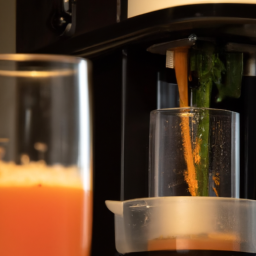
 Juice Tips and Tricks1 week ago
Juice Tips and Tricks1 week agoHow Long Does Juice Last After Juicing
-

 Juice Tips and Tricks1 week ago
Juice Tips and Tricks1 week ago2 Lemons Equal How Much Juice
-

 Vetted3 months ago
Vetted3 months ago15 Best Juices for Diabetics: Refreshing Options That Won’t Spike Your Blood Sugar



